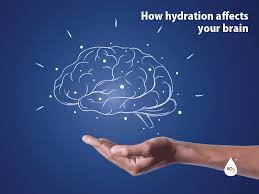Dehydration affect the brain’s function
#Cognitive Function and Memory#
Dehydration is a condition that occurs when the body loses more fluid than it takes in, leading to an insufficient amount of water for normal bodily functions. Water plays a vital role in maintaining the body’s homeostasis, and a lack of hydration can have significant effects on a variety of systems, including the brain. The brain, which is composed of approximately 75% water, is highly sensitive to changes in hydration levels. Dehydration can negatively affect cognitive function, mood, and even physical performance. This essay will explore how dehydration affects brain function, particularly in terms of cognition, emotional regulation, and overall brain health.One of the most immediate and noticeable effects of dehydration on the brain is its effect on cognitive functions such as attention, memory, and decision-making. Studies have shown that even mild dehydration can impair short-term memory and the ability to focus. The brain relies on an adequate supply of water to maintain communication between neurons, which is necessary to process information and form memories. When the body is dehydrated, the brain's ability to transmit electrical signals between neurons becomes less efficient. This disruption in neuronal communication can result in difficulties in concentration, decreased problem-solving skills, and slower reaction times. Dehydration also affects working memory, which is the cognitive system responsible for temporarily retaining and manipulating information. Research has found that people who are dehydrated struggle with tasks that require short-term memory, such as recalling information or performing complex mental calculations. This occurs because dehydration reduces blood volume, which leads to a decrease in the supply of oxygen and glucose to the brain, both of which are necessary for optimal brain function. ### Mood and emotional regulation In addition to cognitive impairment, dehydration can also have a significant impact on mood and emotional regulation. The brain is particularly sensitive to changes in fluid balance, and dehydration has been linked to symptoms of irritability, anxiety, and even depression. Dehydration can increase levels of cortisol, a hormone associated with stress, which can lead to feelings of frustration and emotional instability. In addition, dehydration can decrease serotonin levels in the brain. Serotonin is a neurotransmitter that plays a key role in mood regulation, and a decrease in its levels can contribute to feelings of sadness, hopelessness, and overall low mood.
If chronic dehydration is ignored, it can have long-term effects on brain health. Long-term dehydration can cause the shrinkage of brain cells, which can have detrimental effects on brain structure and function. This process, known as "brain atrophy," is associated with cognitive decline and an increased risk of neurodegenerative diseases such as Alzheimer's disease and dementia. Being highly sensitive to dehydration, neurons in the brain can decrease in both size and number, resulting in decreased memory, learning, and emotional regulation abilities.In addition to affecting brain structure, chronic dehydration can impair the brain's ability to detoxify and remove waste products. The brain has its own unique waste clearance mechanism called the glymphatic system, which is responsible for removing metabolic waste and toxins. Hydration plays an essential role in maintaining the proper function of this system. When the body is dehydrated, the glymphatic system becomes less efficient, causing toxic proteins to accumulate in the brain. This can increase the risk of developing neurodegenerative diseases and other cognitive disorders.
#Dehydration and Brain Performance Under Stress#
The brain's ability to function optimally under stress is also affected by dehydration. When the body is stressed, the brain demands more resources, including glucose and oxygen. Dehydration reduces the availability of these vital resources, reducing the brain's ability to effectively manage stress. This can result in decreased mental clarity, difficulty making decisions, and a general feeling of mental fogginess. Dehydration can also impact physical performance, resulting in mental
A study conducted by researchers at the University of Connecticut found that individuals who were mildly dehydrated reported higher levels of anxiety, fatigue, and negative emotions than those who were adequately hydrated. This suggests that dehydration may not only affect the cognitive functions of the brain, but may also increase feelings of stress and emotional imbalance. In fact, some researchers argue that dehydration may be a contributing factor to mental health disorders, especially in individuals who are prone to conditions such as anxiety and depression.
Click here more site>>>>>>>>>Enjoy in gurugram


.jpg)


Comments
Post a Comment